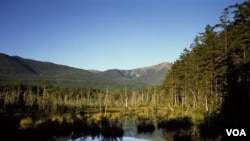The state of Maine, shaped like an oven mitten up in America’s upper-right corner, gets about a week of summer. That’s an exaggeration, of course. It actually gets two weeks of summer.
This is Maine humor - understated. Maine actually has all four seasons:
A short but beautiful fall, though not as colorful as in other New England states, where stands of maple turn vivid colors. Maine is covered mostly in evergreens that just stand there and shiver each autumn, girding for the long, snowy, bitterly cold winter that’s ahead.
Then comes Spring, which Mainers call the “mud season,” when their many dirt roads finally get around to thawing - only to get rained on.
Hot summer weather is rare. Maine’s summertime is like other people’s Spring, with high temperatures about 27 degrees (80 degrees Farenheit) along the coast. So there’s not much sunbathing. That’s just as well. There aren’t many beaches on its rocky shore, and the North Atlantic waters are, shall we say, brisk.
In far-northern Maine, near Canada, and in the piney interior, the average July temperature is just 16 degrees (60 Farenheit), so it’s jacket weather.
Tourists interrupt Maine’s peace and quiet this time of year. They come to eat its succulent lobster, shop at big outlet malls, and, around sunrise or sunset, try to capture photographs of big, brown, shy moose in mossy clearings called bogs.
Bull moose carry a big rack of antlers that hunters love to put over their fireplaces. That’s why you don’t see many bulls.
Maine has what seem like a thousand inlets along its coastline. In fact, if it were a string that you could pull tight, that coastline would be longer than that of California, which runs from Mexico two-thirds of the way up to Canada. At the end of many of Maine’s inlets are cozy, picturesque seaports that tourists love to photograph as well.
Mainers are people of few words. It’s said that you’ll be lucky to get an “ay-yup” - or yes - out of them. Ask them if it bothers them to be called a bit stand-offish and they’ll reply, “Nope.”
There’s a classic story to illustrate their sparse use of words.
Two Maine old-timers are rocking on a porch - back and forth, back and forth, for a couple of hours - without saying a word. Finally, one of them points to a speck in the distance and says, “That there’s a bobcat!” And they go back to rocking.
Five minutes later, the other Mainer replies, “Tain’t.”
Fifteen more minutes go by, and the first old fella gets up, stretches, and says, “Well, got to be goin’. Can’t stand an ar-gu-ment.”
This is Maine humor - understated. Maine actually has all four seasons:
A short but beautiful fall, though not as colorful as in other New England states, where stands of maple turn vivid colors. Maine is covered mostly in evergreens that just stand there and shiver each autumn, girding for the long, snowy, bitterly cold winter that’s ahead.
Then comes Spring, which Mainers call the “mud season,” when their many dirt roads finally get around to thawing - only to get rained on.
Hot summer weather is rare. Maine’s summertime is like other people’s Spring, with high temperatures about 27 degrees (80 degrees Farenheit) along the coast. So there’s not much sunbathing. That’s just as well. There aren’t many beaches on its rocky shore, and the North Atlantic waters are, shall we say, brisk.
In far-northern Maine, near Canada, and in the piney interior, the average July temperature is just 16 degrees (60 Farenheit), so it’s jacket weather.
Tourists interrupt Maine’s peace and quiet this time of year. They come to eat its succulent lobster, shop at big outlet malls, and, around sunrise or sunset, try to capture photographs of big, brown, shy moose in mossy clearings called bogs.
Bull moose carry a big rack of antlers that hunters love to put over their fireplaces. That’s why you don’t see many bulls.
Maine has what seem like a thousand inlets along its coastline. In fact, if it were a string that you could pull tight, that coastline would be longer than that of California, which runs from Mexico two-thirds of the way up to Canada. At the end of many of Maine’s inlets are cozy, picturesque seaports that tourists love to photograph as well.
Mainers are people of few words. It’s said that you’ll be lucky to get an “ay-yup” - or yes - out of them. Ask them if it bothers them to be called a bit stand-offish and they’ll reply, “Nope.”
There’s a classic story to illustrate their sparse use of words.
Two Maine old-timers are rocking on a porch - back and forth, back and forth, for a couple of hours - without saying a word. Finally, one of them points to a speck in the distance and says, “That there’s a bobcat!” And they go back to rocking.
Five minutes later, the other Mainer replies, “Tain’t.”
Fifteen more minutes go by, and the first old fella gets up, stretches, and says, “Well, got to be goin’. Can’t stand an ar-gu-ment.”


